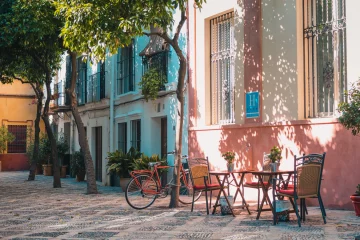Table of Contents
Portuguese speaking countries
All Portuguese speaking countries receive thousands of tourists every year. If you want to visit Portugal, Brazil or Mozambique, you will need to learn some Portuguese phrases for travelers. They will help you to survive and get what you need. You will soon realize that the proper Portuguese phrases for travelers are the key to having the best stay.
Portuguese history
Derived from Latin, Portuguese spread to the western coast of the Iberian Peninsula with the Roman invasion of 218 BC. Since then, Portuguese has been variously influenced and altered, adopting new words used by the Germanic invaders and later, in 711, numerous Arab words after the Moorish invasion of the Peninsula. The result is a language which is spoken in seven countries: Portugal, Brazil, Mozambique, Angola, Sao Tomé, Cape Verde, and Guinea Bissau, spread over five continents. Portuguese is one of the most widely spoken languages in the world with more than 220 million speakers.
Key Portuguese words
Although many Portuguese speakers, especially those in the tourist trade and in big cities, speak English, Portugal and Brazil can supervise English-speaking travelers with one of the biggest language barriers in the world. Locals brighten when you know and use some key Portuguese words. It is advisable to travel with a Portuguese phrase book, particularly if you want to interact with local people. It is sure that you will find that doors open quicker and with some smiles when you can speak a few words of the language.
Learn Portuguese
You can decide to learn Portuguese before traveling. A fast Portuguese course will provide you with enough words. You will discover that Portuguese is not difficult to learn. If you can’t attend a Portuguese school, you can learn Portuguese on the internet. Most Portuguese online courses offer many resources to help you learn this language quickly. You will find Portuguese vocabulary, grammar, and pronunciation lessons. These topics are enough to survive while you travel, although you can ask language school for advanced Portuguese courses, which includes Portuguese verbs, nouns, and other grammatical structures.
If you speak intermediate Spanish, you will be able to stumble through newspapers and read road signs, even if you can’t pronounce the words. Surprisingly, English speakers do much better speaking Portuguese than the Spanish do, because we have roughly the same amount of vowel sounds. To speak Portuguese, take a Portuguese course before you trip here and make sure your professor is Portuguese or Brazilian in order to acquire the correct accent. You will be able to speak with Portuguese speakers after you complete your lessons. You will be ready to ask people for boat transport, car rental, and other things you need while you travel.
Portuguese phrases
The following chart will help you learn some common Portuguese phrases for travelers:
| English | Portuguese |
| Yes/No | Sim/Não (sieng/naung) |
| Please | Por favor/Faz favor (pòr fah-vor/fasj fah-vor) |
| Thank you | Obrigado/da (o-brie-ga-doe/dah) |
| Excuse me | Desculpe (disj-koelp) |
| Hello | Olá(oh-lah) |
| Goodbye | Adeus (a-de-oesj) |
| How are you? | ¿Cómo está? (koh-moe sjtah?) |
| Very well, thank you | Bem, obrigado/da (being o-brie-ga-doe/da) |
| I don’t understand. | Não compreendo. ((naung kom-prie-èn-doe) |
| Do you speak English? | Fala inlgês? (fa-lah ieng-gleesj?) |
| I’m sorry. | Desculpe. (diesj-koelp) |
| How much does this cost? | Quanto custa isto? (kwan-toe koesj-tah isj-toe) |
| I’m just looking. | Estou só a ver obrigado/a. (sjtoo soh ah veer o-brie-gah-doe/ah) |
| What time do you open/close? | A qué horas abren/fecha? (a ki oh-rasj ah-bre/fè-sjah?) |
| size, clothes | tamanho (tah-man-joe) |



0 comentarios